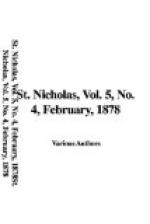MORAL.
Now all you dolls, both little and big,
With china crown and with curling wig,
Before you give way to affection fond,
Remember the fate of Belinda Blonde;
And unless you wish to get terrible knocks,
Don’t set your heart on a Jack-in-the-box.
THE LONDON DUST-MAN
BY ALEXANDER WAINWRIGHT.
There he goes! A dusky gloom hangs over the roofs of great London City; a similar gloom fills my room and seems to have touched all the furniture with smoky age, and as I look down from the window into the gloomy street, I see him coming along slowly, and crying in a voice like a plea for help in affliction: “Dust-oh!—dust-oh!—dust-oh!—dust-oh!”
Not one of the many citizens who are passing notices him, or finds anything strange in that plaintive cry. The people who live in the city see him day after day, and remember how, in their childhood, they had terrifying notions of his weakness for kidnapping and other mysterious wickednesses. They know better now, and hurry past him with scarcely a glance; but to the American visitor he is something of a curiosity.
[Illustration: “DUST-OH!”]
When the London fog is gray we cannot see him very far off, for he, too, is gray from head to foot with ash-dust, and as he approaches us he comes out of the mist like a phantom, though in reality he is a substantial, square-built, deep-chested fellow, shod with enormous Bluecher shoes (the soles of which are bright with nails), and clad in a loose blouse and trousers, that are tied up about the knees. The blouse is open at the chest, and is lifted to the waist by his big, brown hands, which are tucked in his trouser pockets, and his head is covered by the kind of hat that sailors call a sou’wester. His only ornament is a pair of ear-rings; and with his head thrown back he saunters along the street by the side of his cart, repeating in measured tones his cry, “Dust-oh-oh! dust-oh!”
Now and then he stops at a house, and his mate—he has a mate, who is as much like him as pea is like pea—descends into the cellar, bringing forth the ashes and refuse that have accumulated in twenty-four hours, and when the cart, which is a square, box-like affair, is filled he starts for home with his load.
What a queer home it is! It is on the outskirts of the city, far away from the finer streets and buildings. A large space of ground is as gray and dusty as an African or Western desert, and is broken by mounds of ashes, some of which are only a few feet high, while others are almost as high as houses,—quite as high, in fact, as the dismal little shanties on the edge of the reservation in which the dust-man and his fellows live. Other carts and other dust-men are constantly coming and going, dumping one load and then returning to the city for another, and as soon as a load is dumped it is attacked by a crowd of men, women and children, who with shovels, rakes and hooks, turn it over and over, and raise stifling clouds of dust.




